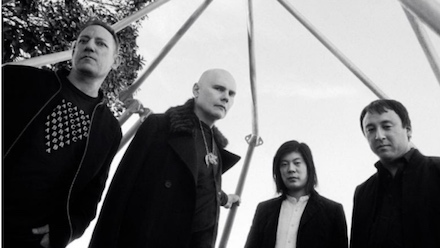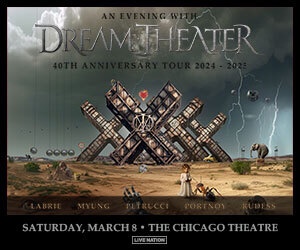Cover Story: Smashing Pumpkins: Never Mind the Gatekeepers
It’s not often that an artist is afforded the privilege of seeing the importance of their career painstakingly delineated in its relative historical importance. You usually have to wait until your screen has faded to afterworld black for that kind of cumulative honor. But at 55, after nearly four decades spent helming Smashing Pumpkins and other sundry spinoffs, Billy Corgan can actually watch his life flash before his eyes, metaphorically, thanks — oddly enough — to Canadian alt-rock twins Tegan & Sara Quin. Their new Amazon Studios-underwritten streaming TV series “High School,” based on their recent formative year’s memoir of the same name, is almost a gushing love letter to Corgan’s shape-shifting Chicago combo; it shows the young Quins — played by twin actresses Railey and Seazynn Gilliland that were discovered on TikTok — first learning to play acoustic guitar to Pumpkin numbers like “Today,” analyzing Corgan’s layered “Disarm” lyrics, and rocking out at awkward parties to several SP catalog classics. The idea is as clear as it is touching — Smashing Pumpkins truly did help soundtrack Tegan and Sara’s early years and helped mold them into the truly unique, increasingly pop-savvy duo that they’ve become on their new sixth effort, Crybaby.
And Corgan — currently on a co-headlining tour with fellow firebrands Janes’ Addiction and preparing to release an intricate three-act, 33-track rock opera dubbed ATUM (preceded by a chugging flagship single “Beguiled”), is truly touched the unexpected honor. After all, inspiring an entire next generation or two is never what a composer sets out to do. But it’s nice work if you can get it, and it only underscores his diehard belief that Smashing Pumpkins has always been a group of the people, not some coddled critical pet. And just as Tegan and Sara have nothing but fond memories of the band’s influence, Corgan firmly believes that the fans have never forgotten him. “It’s the Gatekeepers who have forgotten, and that’s the interesting part,” says the singer/guitarist, now a father of two kids, Augustus Jupiter and Philomena Clementine. “You know, every generation wages this weird war with the Gatekeepers, where they decide what makes the cut. In the ‘60s, The Kinks got cut out of the narrative. The Who got in, The Beatles got in, and the Stones got in, But Donovan and The Kinks didn’t make the cut, even though they were just as huge. That’s some critic — or critics — somewhere deciding that. And I started to see where people were doing that with us, particularly in those years when I was the only original member of the band. I think SPIN once did a list of the Top 150 alternative albums, and Mellon Collie wasn’t even listed, and Siamese Dream was 50th or something — it was that bullshit, right? Like a beauty contest, where somebody decides who’s beautiful. Now the fans haven’t forgotten, trust me. I’m playing to a lot of people every night, and they have not forgotten.”
A good way to keep your fan base interested, naturally, is to constantly gee when popular opinion says haw. Issuing a 33-track may not be what folks are expecting in 2023 — nor a following box-set edition in April with an additional ten cuts — but Corgan couldn’t care less. Art should please the artist first, and then everything else is gravy. He explained his theories to the IE in a recent candid chat….
IE: I just spoke to Peter Hook, who proudly said that his bassist son, Jack Bates, has been quietly playing in the Pumpkins for seven years.
BILLY CORGAN: That’s true. That’s true, yeah! And we do tell people, but no one seemed to pick up on the narrative of that. So it shows up here and there, but Jack has played with us for seven years. And literally, I met him when he was a baby; I got to know him when he was a teenager — Peter would come to our shows and bring Jack along to meet the band, so we just got to know Jack as a person. And seeing Jack play with his father, we eventually kind of circled around on the idea of, “Hey — would you ever want to play with the band?” And he was like, “Yeah! That would be great!” So yeah — he’s a great person, a great musician, so we are so blessed to have Jack in the band.
IE: For a few reasons — but mainly because I fell victim to this myself for a surreal two-year period — what was your recent song “Confessions of a Dopamine Addict” about? I got diagnosed with Parkinson’s in 2017, and they gave me a horrific dopamine-agonist drug called Mirapex that made my life an uncontrollable OCD nightmare and nearly killed me.
BC: Well, first of all, sorry to hear that. But I dunno — it’s just one of those weird titles that just strikes me. It sounds like a book title or something, like a Nelson Algren type of thing. But it struck me that in this generation, we’re basically dealing with dopamine addiction. And no one really talks about the dopamine addiction. People kind of make jokes about it, but all you have to do is stand at the bus terminal for five minutes to see the dopamine addiction playing out right in front of you. And we’ve all done it — you’re standing there, I dunno, you’re waiting for your bag at an airport, and you check the phone, you put your phone back in your pocket, you stand there for a minute, you look around, and then you go, “I guess I’ll check my phone again.” You know? It’s like you need that constant something that only something that’ll give you dopamine will give you. And there’s something about seeing a picture or reading about the latest controversy where you get that little bit of, “Oh! Let’s just do that!” And certainly, as a musician in the 21st century, we’re navigating the dopamine issue.
IE: It’s also interesting that dopamine played a huge role in Stravinsky’s controversial 1913 ballet premiere for “The Rite of Spring.” Too much dopamine can lead to psychosis, and the crowd that night heard so many unfamiliar, dissonant non-classical notes that it went crazy just a few minutes into the performance and rioted. But only a year later, when society’s collective consciousness had to adjust to such a jarring score, a conversely jubilant audience at a symphonic “Rite” concert carried the composer out on its shoulders in triumph.
BC: Sure. And there’s this assumption in modern culture that you can do very little on the musical side to actually create a violent reaction. So, in essence, most violent reactions, musically, are engendered by a kind of fake outrage type of thing. But the fact of the matter is, very few people are actually creating musical outrage because the music that they’re making is so offensive to the senses, or the way they’re playing the music is so offensive to the senses that people have an organic response. But as somebody who’s done it many, many times, it’s a fascinating thing to watch the window move from “You can’t do that” to “Hey — would you do that again?” Do you know what I mean? Circa 1989, I’m in a club playing a long solo, and I’ve got people after the show telling me, “You can’t do that! You’re an alternative band — you can’t play a long solo!” Fast-forward 35 years, and I’ve got some guy in my ear telling me, “Why didn’t you play that song? I’m really bummed you didn’t play that song tonight!” It is so weird. You literally go from the violence of a particular image or a movement to where it becomes sort of sanitized and almost part of their sentimental narrative. So I think that’s my only view on that — that doesn’t surprise me at all because I’ve been there and done that.
IE: And years later, Disney used “The Rite of Spring” in Fantasia, soundtracking a dark scene with dinosaurs fighting in a thunderstorm. The apex of pop culture.
BC: Yes. And I guess what I’m really poking at is, there’s this assumption in modern culture that you can’t do that anymore. Like that’s all past. It’s that blithe kind of “We’ve seen it all” thing. So if you look at most of the outrage musical culture, it’s about what people are doing or saying — it has very little to do with what they’re doing musically. But, back to Stravinsky, he was able to do it organically, with music. And I know the first time I heard Joy Division, for example, I was like, “What am I listening to?” I was both attracted and repelled simultaneously. I wanted to turn it off and hurl the cassette across the room. But I couldn’t stop listening.
IE: And you actually got to play Joy Division songs onstage with New Order years ago. And the look on your face onstage made it seem like you’d ascended to some higher plane.
BC: Yeah. And it’s been an amazing journey, right, you know? Because I’ve gone from the ascended to “Now I’m in the group! I get to play with the band!” But I still have that memory of being in some girl’s apartment, circa 1984 or ’85, and her playing Joy Division. And I just kept saying, “But it’s out of tune.” You know what I mean? And as if that fucking mattered. Something about it was rubbing me wrong, but I had enough sense to realize that it wasn’t a bad thing, but I still had to go through the sensory feeling of, “Wait — this weird. What am I listening to? Is this good?” You know — the classic “Am I supposed to like this?” type of stuff.
IE: And then the gatekeepers saunter along to judge it accordingly.
BC: For every (fair, non-judgmental interview conducted), I’ve talked to ten of the others, and I can’t, even in a sentimental way, point to anything that I was affectionate about. It was like some Rohrshach Test, like some sort of weird test where I’ve gotta make their grade. Like, my accomplishments somehow get fed into their alpha-bullshit-New-York version of what makes the grade. I always thought Lou Reed had it right because he figured out — much like Dylan at an early age — that those (press) people were all full of shit. And he always treated them exactly how they deserved to be treated because they were fucking assholes, do you know what I mean? And he just out-alpha-ed them — he was better at their game than they were, and they hated him for it. I always wondered when people would say, “Oh, Lou Reed — he’s the worst interview.” How can you say Lou Reed is the worst interview when he’s one of the smartest men to ever come down the pike? And he absolutely started a revolution — you can literally trace alternative music’s roots back through Lou Reed, single-handedly, including Bowie. They all paid fealty to Lou because Lou figured that shit out in ’66. He figured out hipster culture and Warhol, and he was singing songs about heroin when he’d never even done heroin. All that shit — he figured it out, much like Dylan. They figured out the code really early. But in his case, he was just smarter than the literati, and they hated him for it. And if you look at the way Lou’s talked about posthumously, it isn’t as affectionately as he should be, because he doesn’t fit in their little comfortable boxes that they have.
They love Bowie now. Have you noticed how they love Bowie now? But remember how they wrote about Bowie in the ‘90s? They just abused the hell out of him —they made fun of him, they mocked him, they wrote silly headlines. They loved every aspect of his alleged downfall, and now they talk about him like he’s a deity. It’s so classic — the hypocrisy is rank, you know? But like a lot of kids, I came up out of the suburbs thinking, “Oh, this guy or girl (journalist) sitting across from me — they really wanna tell the truth, so we’re gonna have a nice conversation about the truth.’ And I learned real quick that that’s not what the game was. I was just fodder in a greater cultural way, and I was not sophisticated enough to know that’s what I was supposed to do.
IE: The first time I talked to Lou Reed, on a phoner not long after The Blue Mask, he made a casual reference to Delmore Schwartz, and I — being from the honest Midwest — innocently asked who that was, and he actually stopped and explained him in meticulous detail. I went out to City Lights [bookstore] the next and bought my first Delmore Schwartz book, and a few later, when I flew down to L.A. to talk to him about New York, I brought him a stack of cool books I’d discovered French surrealist obscurities like La Bas and Maldoror. After I thanked him for being so nice when I’d revealed my cultural ignorance, I asked him why he did that without any condescension, and he replied simply, “I could tell you were curious.” And still, to this day, that’s the watchword, the key ingredient in all great art — curiosity on the part of the artist.
BC: Ah! You know, it’s funny that you say the word ‘curious’ because Jimmy Chamberlin — who’s a very sage person behind the scenes — defines curiosity as the key for people who succeed. He swears the single most important factor in whether or not someone’s gonna be successful is curiosity, and he often talks about musicians in terms of curiosity. So that is a very important word.
IE: When did you first notice that quality in yourself?
BC: That’s a great question. Well, let’s take you back. I remember being in my bedroom, and my father was one of those people that didn’t give a shit about his records — they were always in a state of disrepair. But I had a record player, and I found a stack of 45’s, no sleeves, of course, all scratched up. And one of the records was James Brown and His Famous Flames. And I don’t remember what the record was, but obviously, it was early James Brown. So I listened to the record, and I thought, “That’s such a cool name —‘James Brown and His Famous Flames.’” It put the image in my mind of this band on fire. So I actually took the record to my father and said, “Who is James Brown? And who are The Famous Flames?” And he explained to me who James Brown was. And I’m still listening to James Brown now; you know what I’m saying? That was the start of that journey. And it was just something about the name The Famous Flames that I loved as a seven-year-old, and that’s the curiosity, right? I start from the precept that the artist knows more than I do, and I wanna learn what they have learned. And isn’t that the fucking point? But when journalists try to turn it into a didactic, pedantic thing, like you’re talking down your nose at someone? Most artists, I don’t think, see it that way. I read Donovan’s book recently, and he talks about his poetic process and his life and how he found the troubadour’s voice, and he rocketed to fame. But something about Donovan always felt like, as an artist, he was talking to me almost like he was sitting there cross-legged on the floor, with some incense burning while he was playing the guitar. There was a warmth there, and I feel that warmth with Pete Townshend, with Neil Young, with Dylan. I feel like they’re talking to **me, and I also don’t feel like they’re talking down to me. And the fact that they’re more intelligent than me doesn’t bother me at all, and what’s wrong with that? I loved being in school and listening to a teacher who was way smarter than me explain things to me. And what is wrong with that? We’ve entered into this weird phase where no one wants to be uncomfortable; you know, when someone has some sense of superiority. But there are people who are really good at what they do, and that doesn’t mean that they’re looking down at you. And when you’re a rock musician, you enter that gauntlet, like, “On what side of the street does your arrogance fall?” And I’m like, “What are you **talking about? How do you think I got out of the fucking garage?” I’m in a garage, circa 1985, playing Ted Nugent, and I have to believe that there’s something about me that’s a little bit better than the guy next to me, or why would I get out of the garage?
IE: “When in doubt/ I whip it out/ I got me a rock and roll band/ It’s a Free-For-All.”
BC: Yeah! It’s always good to quote The Nuge!
IE: That’s a perfect segue into “Beguiled,” which has got that classic heavy metal riffing that we were both raised on. Growing up in Indiana, we didn’t understand, when punk rock came along, why you had to give up on the hard rock you loved the day before.
BC: Yeah. I dunno. I seem to do better with guitar music when I’m into playing the guitar a certain way. And “They’re smashing out the veils, return the faith,” and then the other is like, “The charging light brigade returns the faith.” The whole album is a rock musical, so this song is sung from the perspective of the government kind of oppressor character, who’s telling whoever he’s singing to just trust the message. What was the message from the pandemic? “Trust the science.” And I am no fan of blind obedience — I wasn’t with my parents, I wasn’t with my school teachers, and I certainly am not with any institution, whether that be the music business or the person at the post office. I’m sorry — it’s not in me to just take something that somebody says at face value. So it’s kind of a reverse haiku, right? The character singing “Return the faith” on the surface, it sounds like sort of a street chant. But it’s actually the opposite — it’s like the government person is co-opting the language of the streets to say, “You should really trust us. We have your best interests at heart — don’t worry!”
IE: Just like Stravinsky’s original ballet premiere, the “Beguiled” video features ballerinas and odd costuming and choreography. And again, why can’t a modernist rock composer push the boundaries and conjure up a three-act musical with 33 or 44 songs?
BC: Yeah. And that’s sort of the challenge, right? What animates energy? And I think when you’re in a band that has some miles behind you, there’s sort of an institutional…what’s the word? Calcification that comes in, sort of like This is what you do, and this is what you represent. And I keep saying, internally, “No — that is not who we are. We have never been that band, and we will never be that band.” I think that one of the biggest struggles that people have had with us over the years is that the Smashing Pumpkins don’t have a particular moral center. Most bands kind of have an identifiable center. And I liken our lack of moral center — or my lack of moral center — to child abuse. When you’re heavily abused as a child, you learn to wear a shifting set of masks to avoid them ever getting to the core or the middle of this argument, right? When I was under duress in the music business, I learned to do the same thing. I set up just a phalanx of images and distortion, and not very often; I would let someone like yourself get past all the masks and say, “Well, this is what’s going on.” And what’s even more odd for me is, sometimes I would talk about these things, and the journalist would have no interest in them because they were much more fascinated in the masks. Which sort of confirms the point, right? They’re more interested in the artifice than the art. They’re more interested in the false impression than the true one or even how a true person can create false art. But when you talk about the video, the video is very much a modern riff on the world we live in, where there’s a bunch of dopamine going on, and what does it mean to put all these things under one roof? And that’s exactly the point — we’ve somehow established meaning where there is no meaning. We often talk about things, ad nauseam, for 48 hours that 48 hours later have no meaning anymore. The cipher has been completely drained — there’s nothing left. We’re almost more fascinated with the hunt-kill-acquire-destroy than we are the substance at the heart of the matter, and that’s become kind of a cultural thing, right? So I think it’s sort of interesting when you have a band that’s been around — and obviously, not continuously — for 34-plus years because people think they know what it is, and the band keeps stamping out the image. I think that’s actually more modern than to say, “No, this is who we are. This is our little corner of the world — we own the Dark, Alternative Goth space.” It’s like, Who gives a shit?
IE: But where, exactly, do you get those fabulous robes made?
BC: Ha! Well, you call the Fabulous Robe Maker! I think that’s a good way to sum it all up. For me, when I approach a musical motif or a symbol or a lyric or an image, and it makes me uncomfortable, I ask myself, “Why?” Like, what is it that’s so threatening about this riff or this dress? Why am I, at 55, uncomfortable when I should be comfortable? So I have to ask myself, Where did the energy come from? And that’s a lot of cultures, right? There are a lot of things that still make people uncomfortable, but they couldn’t tell you why. And I’m not talking about a blatant offensive thing that would obviously be offensive if it was shown to them in a movie theatre. I’m talking about things that really shouldn’t be that difficult, but somehow they are. William Burroughs often talked about how you could take a sentence, and it would be completely non-offensive. But if you re-ordered the words, it would become offensive, so he would talk about how there was a hidden violence in words. And depending on what order you placed them in, the violence would be revealed. So I like finding the hidden violence in things. So I’ve always been attracted to that idea — why do people get grumpy about a dad of two young children wearing a dress? But it still irritates people, and I find that kind of funny. Like, Who cares? My job will be done when it no longer does, and that’s the whole point.
-Tom Lanham
Smashing Pumpkins (with Jane’s Addiction) plays the United Center, Chicago November 5
Category: Cover Story, Featured














